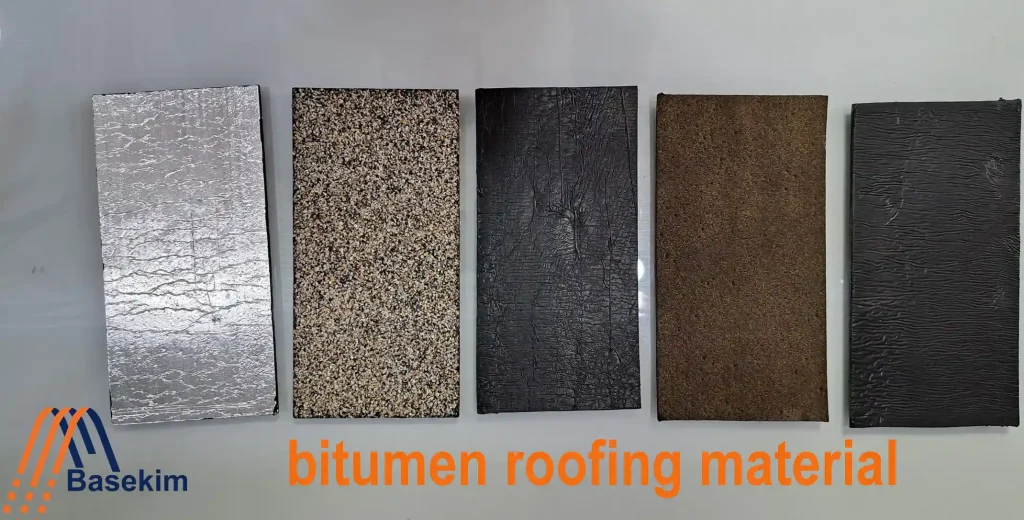
When it comes to roofing, strength and reliability matter. That’s why many manufacturers and buyers turn to bitumen roofing material. It offers long-lasting performance, great protection, and cost-effectiveness. Whether you’re building a new structure or repairing an old one, bitumen could be the best option for your roofing needs.
In this guide, we’ll explore what bitumen roofing material is, why it’s widely used, and how Basekim, a trusted supplier, can help you get top-quality materials for your projects.
What Is Bitumen Roofing Material?
Bitumen roofing material combines asphalt (bitumen) with reinforcing fabrics like fiberglass or polyester to form a waterproof sheet. This material forms a durable barrier that shields roofs from water, heat, and UV rays.
Although producers derive bitumen as a byproduct of crude oil, they specially process it to perform effectively in construction. Roofing professionals have used it for decades because it adheres well, lasts long, and withstands harsh weather conditions.
There are two main types of bitumen roofing material:
APP (Atactic Polypropylene) – This is modified with plastic to make it flexible and heat-resistant.
SBS (Styrene-Butadiene-Styrene) – This one is modified with rubber to improve elasticity and cold flexibility.
Because these materials can expand and contract, they stay strong in both hot and cold climates.
Why Choose Bitumen for Roofing?
There are many roofing materials on the market. However, bitumen stands out for several important reasons:
1. Durability
First of all, bitumen roofing material is made to last. Most systems offer up to 20 years or more of solid performance. This means fewer repairs, less maintenance, and long-term savings.
2. Weather Resistance
Whether it’s rain, snow, heat, or wind, bitumen roofs handle it well. In fact, their waterproof design protects buildings even during storms. As a result, many industrial and commercial buildings rely on it.
3. Easy Installation
Compared to other materials, bitumen sheets are easier to apply. They can be torch-applied, self-adhered, or cold-applied, depending on your project. That flexibility saves time and labor costs.
4. Low Maintenance
Because bitumen is tough, it doesn’t need much care. Small cracks and leaks can be patched easily, and most systems hold up under foot traffic.
5. Cost-Effective
Although the upfront cost might be slightly higher than basic asphalt shingles, the total cost over time is much lower. You get fewer leaks, fewer repairs, and longer service life.
How Bitumen Roofing Material Is Used
Bitumen roofing is used in various ways. Here are a few common applications:
Flat Roofs: Ideal for factories, warehouses, and commercial buildings.
Pitched Roofs: Modified bitumen is use under shingles for extra protection.
Bridges & Tunnels: Bitumen sheets provide waterproofing in civil engineering projects.
Because it’s so adaptable, bitumen roofing material works well for both new constructions and roof restorations.
Basekim: A Trusted Supplier of Bitumen Roofing Material
When choosing a supplier, quality and reliability are key. This is where Basekim comes in.
Basekim is a leading manufacturer and supplier of waterproofing and insulation materials, including bitumen roofing systems. Thanks to their advanced technology and strict quality control, Basekim delivers products that meet international standards.
Moreover, they offer:
Custom product options
Fast delivery
Technical support
Competitive pricing
So, if you’re a manufacturer or buyer looking for dependable roofing materials, Basekim should be your first stop.
Environmental Benefits of Bitumen Roofing
Some may wonder: is bitumen bad for the environment?
Actually, modern bitumen roofing systems are more eco-friendly than you might think. For instance:
Recyclable: Old bitumen roofs can often be reused or repurposed.
Energy Efficient: When combined with reflective coatings, bitumen helps lower cooling costs.
Reduced Waste: Because it lasts longer, less material ends up in landfills.
So, choosing bitumen doesn’t just help your bottom line — it also helps the planet.
What to Look for When Buying Bitumen Roofing Material
Now that you understand the benefits, how do you choose the right bitumen roofing material?
Here are some tips:
Check the Type: Decide between APP or SBS based on your climate and needs.
Review Thickness: Thicker sheets last longer and offer more protection.
Ask About Reinforcement: Fiberglass and polyester each offer unique advantages.
Confirm Certification: Always choose products that meet ISO or CE standards.
Buy from a Trusted Supplier: A company like Basekim ensures you get what you pay for.
Taking time to choose the right product will lead to better performance and fewer issues in the long run.
Installation Tips for Best Results
Although bitumen roofing material is easy to work with, here are a few tips for success:
Clean the surface before applying sheets.
Use proper primer if required.
Ensure correct overlap between rolls to avoid leaks.
Use a roller to remove air pockets.
Seal all joints using a torch or cold adhesive.
If you’re unsure about any step, it’s best to hire a trained installer or ask your supplier for guidance.
Final Thoughts
In conclusion, bitumen roofing material is a smart choice for anyone looking for strong, weatherproof, and cost-effective roofing solutions. Whether you’re a manufacturer building on a large scale or a buyer looking for quality, bitumen delivers results you can count on.
Thanks to its durability, ease of use, and flexibility, it remains one of the top picks for roofs around the world. Plus, with reliable suppliers like Basekim, you can be confident you’re getting high-quality materials that meet your exact needs.
So next time you’re planning a roofing project, remember: bitumen is not just an option — it’s often the best one.

